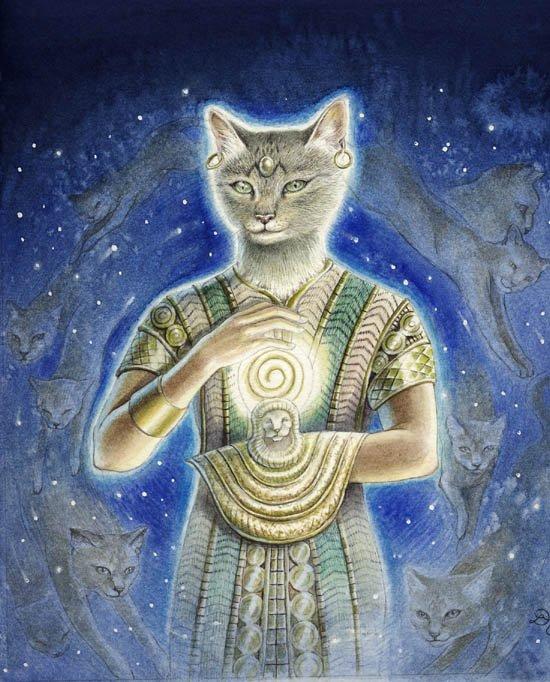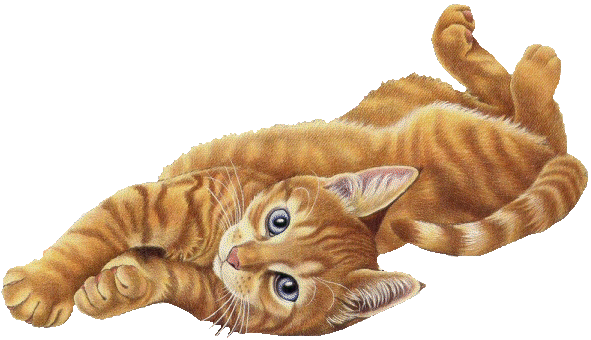 Submitted by Kat on
Submitted by Kat on

Cat history, it is generally believed, can be traced back to the Miacis, a weasel like creature that inhabited the earth some 40 or so million years ago. Not only the history of the cat, but the history of all land dwelling carnivores can be traced back to the Miacis, and that includes dogs!
By the close of the Stone Age cats had learned that where humans were found, there was the easy prey of rodents, this was still too early in time for them to be considered domestic pets.
A cat's jawbone that has been dated to 6000 BC was uncovered on the island of Cyprus, and as cats are not indigenous to the island, it points to cats arriving on the island along with the first human colonists.
The cat family can trace their genealogy back to ancient Cyprus and Egypt. Unlike the domestication of the dog, pack animals with a built-in cooperative instinct, the full domestication of the cat (about 4,000 years ago) was not so easily achieved.
It seems that the first cats to live near people were the African wild cats of Egypt. These cats were probably attracted by the mice and rats that filled the Egyptian grain stores. Apparently, the ancient Egyptians were very appreciative of the cats' help in vermin control. In fact, a cult of cat worship eventually grew until it became an integral part of Egyptian society. The cat goddess Bastet (also known as Bast or Pasht) became one of the most revered figures of worship. Bastet had the body of a woman and the head of a cat. Associated with fertility, motherhood, grace, and beauty, Bastet's largest temple was in the city of Bubastis. The word for cat in ancient Egypt was "mau," similar to our "meow," a universal cat word. The cats were considered gods and killing a cat was punishable by death.
So revered were cats in the Egyptian society, that during times of calamity - fire or
flood as an example - cats were often rescued before humans.
During the Middle Ages, however, cats did not fare so well, particularly in Europe. Superstitions grew about cats and they came to be seen as harbingers of evil, often believed to be endowed with powers of black magic--an associate of witches and warlocks and perhaps the embodiment of the devil. Cat owners were the subject of suspicion and were often persecuted along with their cats, sometimessharing death with them. Cats were hunted, tortured, and sacrificed. On religious feast days, large numbers of cats were sometimes burned alive as part of the celebrations. Live cats were sealed inside the walls of houses and other buildings as they were being constructed, in the belief that this would bring good luck.
During the twentieth century, cats enjoyed a renaissance. As the urbanization of western society grew, cats demonstrated an amazing ability to adapt to a myriad of different lifestyles and living conditions.
Are cats psychic?
Animals can generally sense more than we do. In many cases this is simply because the ordinary senses such as sight and smell are more efficient and the animal is better attuned to them. However some reports of animal sensitivity seem to go beyond this and the psychic cat is well established in folklore.
The strange psychic powers of animals - if they exist - seem to be strongest in dogs and cats. This is possibly because in our Western society they are the advanced mammals that with which most humans have most contact.
Statistics
A 1997 survey showed that 53% of dog owners and 33% of cat owners believed that their pet responded to their unspoken commands.
Such results could be put down the wishful thinking on the part of the human or of the animal picking up on non-verbal cues. More difficult to explain is the fact that many pets seem to know when their owner is about to arrive home, even if this is at a wildly different time to normal. 46% of dog owners thought this to be the case compared with a mere 14% of cat owners.
Those familiar with cats might suspect that the other 86% did indeed know but were simply too cool to show it.
Premonitions
Many animals also appear to have premonitions and become agitated before a disaster. The most well known example is animals of all types apparently predicting earthquakes.
There are tales from World War II, especially during the London Blitz, of cats knowing when an air raid was on the way. Often they would become visibly alarmed and would sometimes head for the shelter themselves, thus allowing the family to get to safety long before the sirens began to wail.
These examples could be due to the cats picking up subtle sensory cues to which we are insensitive. However many animals, especially cats, also seem to have premonitions of other forms of disaster for which there is no apparent physical cue.
In the same way that cats know when their "owner" is due home it has also been said that they know when the owner has come to harm. There are many stories of cats becoming visibly distressed when their owner is involved in an accident, even when this occurs many miles away.
There are also reports that cats seem able to sense when someone participating in an out-of-body experience comes close to them.
These alleged psychic powers of cats, along with their supposed ability to sense the spirit world, are probably one reason for their association with medieval witchcraft.
How to tell if your cat is psychic
Instructions
1. Cats have long been revered for their intuitive abilities. The ancient Egyptians called their cats "Mau" which means "the seer or to see." You can also see if your cat can read your mind, or, even more fortuitously, save your life. If you live in an earthquake zone (like California), you can bet your cat will predict an earthquake before the rumbling starts. The first step to determining the psychic abilities of your cat is to study your cat's body language. If your cat is behaving strangely, exhibiting some unusual body language (tail down), ears down, disappearing, you can bet something is afoot in your life or your location...
2. It has been demonstrated scientifically that cats understand at least 100 words. If that is true, when we think of a word (like "play" or "food") before we even say it, our cat might know what we're visualizing, and head for the catnip mouse, yarn ball or the food dish. You can test your cat's thinking by seeing yourself, in your mind, adding food to the cat bowl. If your cat wanders over to the bowl, right as you are thinking of it (at a random time), while seated on the couch, you have established telepathy with your pet. Of course, you will need to practice this more than once, to validate it and determine it was not coincidence.
3. Another test is to sit quietly with your cat (but not at meal time), and lovingly stroke your pet. In your mind (but not aloud), repeat how much you love and treasure your cat. Your cat may continue purring, even though you have stopped stroking and petting. If you ask your cat, silently, "Do you love me?" wait for the cat to respond in a meaningful way, with a lick, more intense purring or a good face rub against your hands. You may need to practice this test a few times to see if you can actually communicate, mind to mind. Even if it takes a while, both you and your cat will benefit from the stress-reducing close contact you enjoy. But, given your willingness to experiment, in a relaxed manner, and the cat's intuitive skills, you should be able to demonstrate ESP.

- 1200 reads